【留学生找工作】留学生回国找工作见过最不走心的面试题了...
- 格式:docx
- 大小:1.54 MB
- 文档页数:6
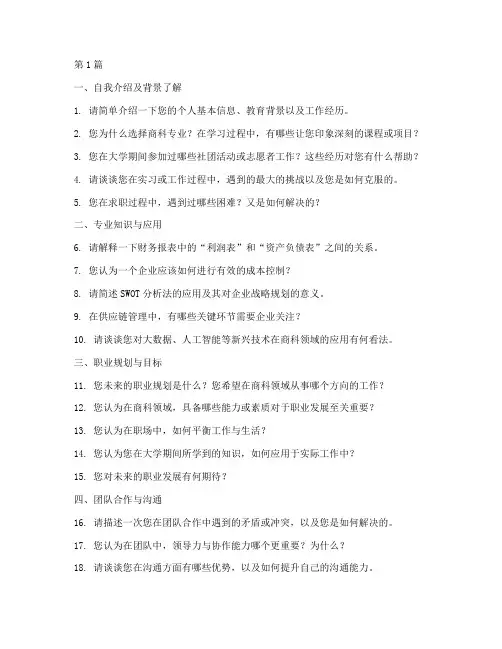
第1篇一、自我介绍及背景了解1. 请简单介绍一下您的个人基本信息、教育背景以及工作经历。
2. 您为什么选择商科专业?在学习过程中,有哪些让您印象深刻的课程或项目?3. 您在大学期间参加过哪些社团活动或志愿者工作?这些经历对您有什么帮助?4. 请谈谈您在实习或工作过程中,遇到的最大的挑战以及您是如何克服的。
5. 您在求职过程中,遇到过哪些困难?又是如何解决的?二、专业知识与应用6. 请解释一下财务报表中的“利润表”和“资产负债表”之间的关系。
7. 您认为一个企业应该如何进行有效的成本控制?8. 请简述SWOT分析法的应用及其对企业战略规划的意义。
9. 在供应链管理中,有哪些关键环节需要企业关注?10. 请谈谈您对大数据、人工智能等新兴技术在商科领域的应用有何看法。
三、职业规划与目标11. 您未来的职业规划是什么?您希望在商科领域从事哪个方向的工作?12. 您认为在商科领域,具备哪些能力或素质对于职业发展至关重要?13. 您认为在职场中,如何平衡工作与生活?14. 您认为您在大学期间所学到的知识,如何应用于实际工作中?15. 您对未来的职业发展有何期待?四、团队合作与沟通16. 请描述一次您在团队合作中遇到的矛盾或冲突,以及您是如何解决的。
17. 您认为在团队中,领导力与协作能力哪个更重要?为什么?18. 请谈谈您在沟通方面有哪些优势,以及如何提升自己的沟通能力。
19. 您在团队中如何发挥自己的优势,为团队带来价值?20. 在面对不同性格和背景的团队成员时,您如何进行有效沟通?五、问题解决与决策21. 请描述一次您在解决问题时,如何运用所学知识进行分析和决策。
22. 在面对复杂问题时,您如何确定问题的核心?23. 您认为在决策过程中,哪些因素最重要?为什么?24. 请谈谈您在实习或工作中,遇到的一个棘手问题,以及您是如何解决的。
25. 在团队合作中,如何确保决策的有效性和可行性?六、市场分析与竞争26. 请分析我国某行业的发展现状及未来趋势。

你是否向往到谷歌、苹果、亚马逊这样富有创造性的IT企业工作?但你也要知道,想要加入他们,面试过程也是出了奇的煎熬,他们不仅考核面试者的技术和商业知识,还会给出一些古怪的问题,看面试者如何回应,从中得出一份针对性的评价来确定是否雇佣你。
Glassdoor是一家就业和职业网络社区,日前通过梳理去年的面试问题发布了一个榜单,列出了过去十二个月里求职者被问到的25个最怪异的面试题。
创业邦选取其中最无厘头的10个,看看它们是否也让你绞尽脑汁:1.“如果你可以在办公室里举行游行,不限形式,你会弄成什么样子?”购鞋网站Zappos招聘客户服务专员时的提问。
2.“你是幸运儿吗?为什么?”旅行房屋租赁社区Airbnb招聘内容负责人时的提问。
3.“你是个披萨送货员,给你把剪刀,你怎么用它赚钱?”苹果面试天才吧Specialist专家时的提问。
某Glassdoor用户说,他会以用剪刀将批萨切成小块以方便小孩子食用为卖点。
”4.“你更像猎人(Hunter),还是更像采集助手?(Gatherer)”戴尔招聘客户经理时的提问。
5.“你相信大脚怪(Bigfoot)存在吗?”挪威人邮轮(NorwegianCruise Line)招聘协调员时的提问6.“为什么网球有绒毛?”施乐公司招聘客户经理时的提问。
Glassdoor社区上提供的答案是,绒毛能够减慢球在空中“飞行”时的速度。
7.“每年美国人要吃掉多少平方英尺的批萨?”银行业巨头高盛在招聘程序分析师时的提问。
这是个非常经典的问题,据说答案需要利用哥伦比亚大学发现的一个公式来计算得出。
8.“你能用语言描述教会别人折‘抓虱子’么(类似中国人小时侯玩的“东西南北”折纸游戏)?”还记得小学老师是怎么教的么?这是团购网站LivingSocial招聘导购员时的提问。
9.“你认为互联网是怎么工作的?”这是云公司Akamai招聘主管时,对求职者的提问。
10.“如果将你的生平拍成电影,谁来扮演你?原因是什么?”上市公司SinglePlatform在面试内部销售顾问人员时问了这个问题。
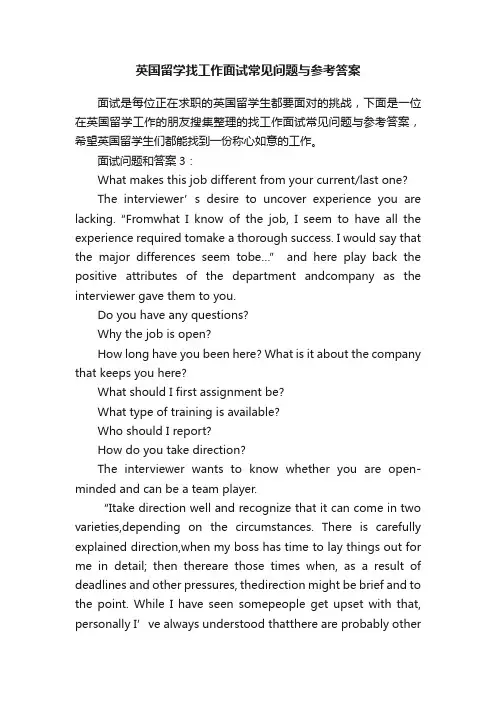
英国留学找工作面试常见问题与参考答案面试是每位正在求职的英国留学生都要面对的挑战,下面是一位在英国留学工作的朋友搜集整理的找工作面试常见问题与参考答案,希望英国留学生们都能找到一份称心如意的工作。
面试问题和答案3:What makes this job different from your current/last one?The interviewer’s desire to uncover experience you are lacking.“Fromwhat I know of the job, I seem to have all the experience required tomake a thorough success. I would say that the major differences seem tobe…” and here play back the positive attributes of the department andcompany as the interviewer gave them to you.Do you have any questions?Why the job is open?How long have you been here? What is it about the company that keeps you here?What should I first assignment be?What type of training is available?Who should I report?How do you take direction?The interviewer wants to know whether you are open-minded and can be a team player.“Itake direction well and recognize that it can come in two varieties,depending on the circumstances. There is carefully explained direction,when my boss has time to lay things out for me in detail; then thereare those times when, as a result of deadlines and other pressures, thedirection might be brief and to the point. While I have seen somepeople get upset with that, personally I’ve always understood thatthere are probably otherconsiderations I am not aware of. As such, Itake the direction and get on with the job without taking offense, somy boss can get on with her job. It’s the only way.”Would you like to have your boss’s job?Seeks to determine how goal-oriented and motivated you are in your work life.“Well,if my boss were promoted over the coming years, I would hope to havemade a consistent enough contribution to warrant his recommendation. Itis not that I am looking to take any one’s job; rather, I am looking fora manager who will help me develop my capabilities and grow with him.”What do you think of your current/last boss?Short, sweet, and shut up.“I liked her as a person, respected her professionally, and appreciated her guidance.”Describe a situation where your work or an idea was criticized.How you handle criticism and to detail your faults.“Ilistened carefully and resisted the temptation to interrupt or defendmyself. Then I fed back what I heard to make sure the facts werestraight. I asked for advice, we bounced some ideas around, then I cameback later and represented the idea in a more viable format. Mysupervisor’s input was invaluable.”Tell me about yourself.Relevanceto the world of your professional endeavor, honesty, integrity, being ateam player, or determination. Keep answer to one or two minutes. Useresume summary as base to start.“Iput my heart into everything I do, whether it be sports or work. I findthat getting along with teammates-or professionalpeer-ma kes life moreenjoyable and productive.”How do you get along with different kinds of people?Howyou work in a team environment, and how you solicit and accept input,ideas, and viewpoints from a variety of sources. Give a quick, honest,illustration of learning from a coworker who is obviously differentfrom you in some way.Rate yourself on a scale of one to ten.Youare probably best claiming to be an eight or nine, saying that youalways give of your best, but that in doing so you always increase yourskills and therefore always see room for improvement.What kinds of things do you worry about?It is best to confine your answer to the sensible worries of a conscientious professional.“Iworry about deadlines, staff turnover, tardiness, backup plans for whenthe computer crashes, or that one of my auditors burns out or defectsto the competition―just the normal stuff. It goes with the territory,so I don’t let it get me down.”What is the most difficult situation you have faced?How do you define difficult? And what was your handling of the situation?Must have story for this. Avoid talking about problems that have to dowith coworkers. You can talk about the difficult decision to firesomeone.What are some of the things that bother you?Show you can remain calm,“Ienjo y my work and believe in giving value to my employer. Dealing withclock-watchers and the ones who regularly get sick on Mondays andFridays really bothers me, but it’s not something that gets me angry oranything like that.”What have you done that shows initiative?Look for ways to increase sales, save time, or save money.What are some of the things about which you and your supervisor disagreed?Not disagree.In what areas do you feel your supervisor could have done a better job?“Ihave always had the highe st respect for my supervisor. I have alwaysbeen so busy learning from Mr. Jones that I don’t think he could havedone a better job. He has really brought me to the point where I amready for greater challenges. That’s why I’m here.”What are some of the things your supervisor did that you disliked?Smoke.(我面试的时候总是这样回答How well do you feel your boss rated your job performance?Ask for written evaluations of your work before leaving a company.“Mysupervisor always rated my job performance well. In fact, I was alwaysrated as being capable of accepting further responsibilities. Theproblem was there was nothing available in the company―that’s why I’mhere.”How did your boss get the best out of you?This is a manageability question.“Mylast boss got superior effort and performance by treating me like ahuman being and giving me the same personal respect with which sheliked to be treated herself.”How interested are you in sport?How to get along with others and pull together as a team.“Ireally enjoy most team sports. Don’t get a lot of time to indulgemyself, but I am a regular member of my company’ssoftball team.”What personal characteristics are necessary for success in your field?It’s a brief recital of key personal profiles.“To be successful in my field? Drive, motivation, energy, confidence, determination, good communication.”Do you prefer working with others or alone?Determine whether you are a team player.“I’mquite happy working alone when necessary. I don’t need much constantreassurance. But I prefer to work in a group―so much more gets achievedwhen people pull together.”Explain your role as a group/team member.Describe yourself as either a team player.“Iperform my job in a way that helps others to do theirs in an efficientfashion. Beyond the mechanics, we all have a responsibility to make theworkplace a friendly and pleasant place to be. That means everyoneworking for the common good and making the necessary personalsacrifices toward that good.”How would you define a conducive work atmosphere?Tricky question. Keep it short and sweet.“One where the team has a genuine interests in its work and desire to turn out a good product/deliver a good service.”Do you make your opinions known when you disagree with the views of your supervisor?Statethat you come from an environment where input is encouraged when ithelps the team’s ability to get the job done efficiently.“Ifopinions are sought in a meeting, I will give mine, although I amcareful to be aware of others’ feelings. I will never criticize acoworker or a superior in open forum; besides, it is quitepossible todisagree without being disagreeable. However, my past manager made itclear that she valued my opinion by asking for it. So, after a while,if there was something I felt strongly about, I would make anappointment to sit down and discuss it one-on-one.”What would you say about a supervisor who was unfair or difficult to work with?“Iwould make an appointment to see the supervisor and diplomaticallyexplain that I felt uncomfortable in our relationship, that I felt heor she was not treating me as a professional colleague, and thereforethat I might not be performing up to standard in some way―that I wantedto right matters and ask for his input as to what I must do to create aprofessional relationship.I would enter into the discussion in theframe of mind that we were equally responsible for whatevercommunication problems existed, and that this wasn’t just the manager’sproblem.”Do you consider yourself a natural leader or born follower?“Nomatter how well developed any individual’s leadership qualities, anintegral part of the skills of a leader is to take direction from hisor her immediate boss, and also to seek the input of the people beingsupervised. The wise leader will always follow good advice and soundbusiness judgment wherever it comes from. I would say that given thedesire to be a leader, the true leader in the modern business worldmust embrace both.”Why do you feel you are a better assistant than some of your coworkers?“Ithink that question is be st answered by a manager. It is so difficultto be objective, and I really don’t like to slight my coworkers. Idon’t spend my time thinking about how superior I am, because thatwould be detrimental to our working togetheras a team. I believe,however, some of the qualities that make me an outstanding are…”You have a doctor’s appointment arranged for noon. You’re waited two weeks to get in. An urgent meeting is scheduled at the last moment, though. What do you do?“If I were the manager who had to schedule a really important meeting at the last moment, and someone on my staff chose to go to the doctor’s instead, how would I feel? The first thing I would do is reschedule the appointment and save the doctor’s office inconvenience. Then I would immediately make sure I was properly prepared for the emergency meeting.”How do you manage to interview while still employed?Best to make the answer short and sweet and let the interviewer moves on to richer areas of inquiry.“I had some vacation time, so I went to my bo ss and explained I needed a couple of days off for some personal business, and asked her what days would be most suitable. Although I plan to change jobs, I don’t in any way want to hurt my current employer in the process by being absent during a crunch.”When do you expect a promotion?Tread warily, show you believe in yourself, and have both feet firmly planted on the ground.“That depends on a few criteria. Of course, I cannot expect promotions without the performance that marks me as deserving of promotion. I also need to join a company that has the growth necessary to provide the opportunity. I hope that my manager believes in promoting from within and will help me grow so that I will have the skills necessary to be considered for promotion when the opp ortunity comes along.”Tell me a story.Ask, “What would you like me to tell you a story about?” People who answer the question without qualifying show that they do not think through carefully. Tell a story that shows like people, willingness, and manageab ility. Don’t discuss love life.What have your other jobs taught you?Talk about the professional skills you have learned and the personality traits you have polished.“There are two general things I have learned from past jobs. First, if you are confused, ask―it’s better to ask a dumb question than make a stupid mistake. Second, it’s better to promise less and produce more than to make unrealistic forecasts.”。
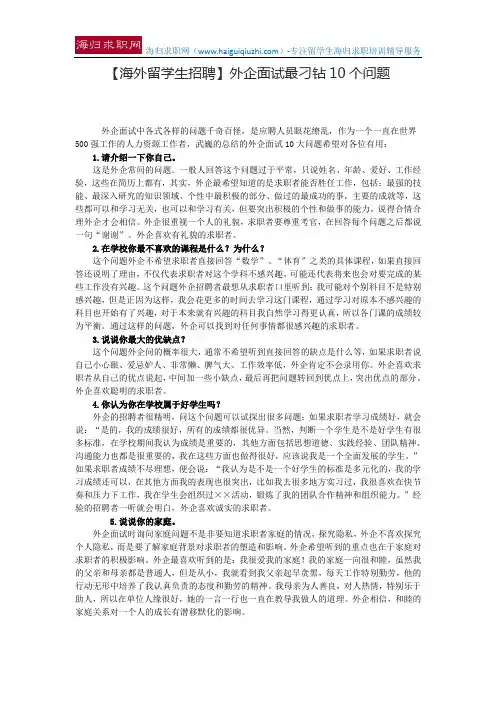
外企面试中各式各样的问题千奇百怪,是应聘人员眼花缭乱,作为一个一直在世界500强工作的人力资源工作者,武巍的总结的外企面试10大问题希望对各位有用:1.请介绍一下你自己。
这是外企常问的问题。
一般人回答这个问题过于平常,只说姓名、年龄、爱好、工作经验,这些在简历上都有,其实,外企最希望知道的是求职者能否胜任工作,包括:最强的技能、最深入研究的知识领域、个性中最积极的部分、做过的最成功的事,主要的成就等,这些都可以和学习无关,也可以和学习有关,但要突出积极的个性和做事的能力,说得合情合理外企才会相信。
外企很重视一个人的礼貌,求职者要尊重考官,在回答每个问题之后都说一句“谢谢”。
外企喜欢有礼貌的求职者。
2.在学校你最不喜欢的课程是什么?为什么?这个问题外企不希望求职者直接回答“数学”、“体育”之类的具体课程,如果直接回答还说明了理由,不仅代表求职者对这个学科不感兴趣,可能还代表将来也会对要完成的某些工作没有兴趣。
这个问题外企招聘者最想从求职者口里听到:我可能对个别科目不是特别感兴趣,但是正因为这样,我会花更多的时间去学习这门课程,通过学习对原本不感兴趣的科目也开始有了兴趣,对于本来就有兴趣的科目我自然学习得更认真,所以各门课的成绩较为平衡。
通过这样的问题,外企可以找到对任何事情都很感兴趣的求职者。
3.说说你最大的优缺点?这个问题外企问的概率很大,通常不希望听到直接回答的缺点是什么等,如果求职者说自己小心眼、爱忌妒人、非常懒、脾气大、工作效率低,外企肯定不会录用你。
外企喜欢求职者从自己的优点说起,中间加一些小缺点,最后再把问题转回到优点上,突出优点的部分。
外企喜欢聪明的求职者。
4.你认为你在学校属于好学生吗?外企的招聘者很精明,问这个问题可以试探出很多问题:如果求职者学习成绩好,就会说:“是的,我的成绩很好,所有的成绩都很优异。
当然,判断一个学生是不是好学生有很多标准,在学校期间我认为成绩是重要的,其他方面包括思想道德、实践经验、团队精神、沟通能力也都是很重要的,我在这些方面也做得很好,应该说我是一个全面发展的学生。
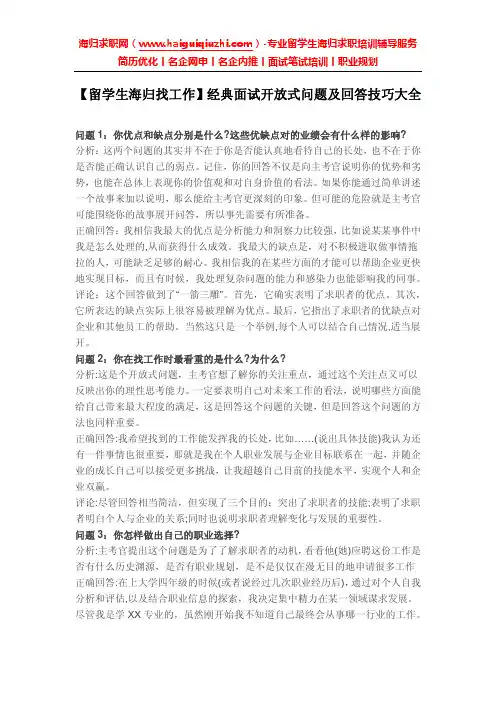
【留学生海归找工作】经典面试开放式问题及回答技巧大全问题1:你优点和缺点分别是什么?这些优缺点对的业绩会有什么样的影响?分析:这两个问题的其实并不在于你是否能认真地看待自己的长处,也不在于你是否能正确认识自己的弱点。
记住,你的回答不仅是向主考官说明你的优势和劣势,也能在总体上表现你的价值观和对自身价值的看法。
如果你能通过简单讲述一个故事来加以说明,那么能给主考官更深刻的印象。
但可能的危险就是主考官可能围绕你的故事展开问答,所以事先需要有所准备。
正确回答:我相信我最大的优点是分析能力和洞察力比较强,比如说某某事件中我是怎么处理的,从而获得什么成效。
我最大的缺点是,对不积极进取做事情拖拉的人,可能缺乏足够的耐心。
我相信我的在某些方面的才能可以帮助企业更快地实现目标,而且有时候,我处理复杂问题的能力和感染力也能影响我的同事。
评论:这个回答做到了“一箭三雕”。
首先,它确实表明了求职者的优点。
其次,它所表达的缺点实际上很容易被理解为优点。
最后,它指出了求职者的优缺点对企业和其他员工的帮助。
当然这只是一个举例,每个人可以结合自己情况,适当展开。
问题2:你在找工作时最看重的是什么?为什么?分析:这是个开放式问题,主考官想了解你的关注重点,通过这个关注点又可以反映出你的理性思考能力。
一定要表明自己对未来工作的看法,说明哪些方面能给自己带来最大程度的满足,这是回答这个问题的关键,但是回答这个问题的方法也同样重要。
正确回答:我希望找到的工作能发挥我的长处,比如……(说出具体技能)我认为还有一件事情也很重要,那就是我在个人职业发展与企业目标联系在一起,并随企业的成长自己可以接受更多挑战,让我超越自己目前的技能水平,实现个人和企业双赢。
评论:尽管回答相当简洁,但实现了三个目的:突出了求职者的技能;表明了求职者明白个人与企业的关系;同时也说明求职者理解变化与发展的重要性。
问题3:你怎样做出自己的职业选择?分析:主考官提出这个问题是为了了解求职者的动机,看看他(她)应聘这份工作是否有什么历史渊源,是否有职业规划,是不是仅仅在漫无目的地申请很多工作正确回答:在上大学四年级的时候(或者说经过几次职业经历后),通过对个人自我分析和评估,以及结合职业信息的探索,我决定集中精力在某一领域谋求发展。
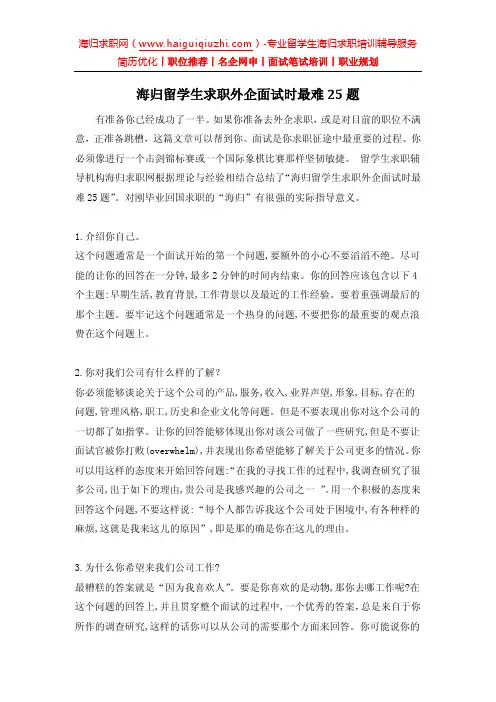
海归留学生求职外企面试时最难25题有准备你已经成功了一半。
如果你准备去外企求职,或是对目前的职位不满意,正准备跳槽,这篇文章可以帮到你。
面试是你求职征途中最重要的过程。
你必须像进行一个击剑锦标赛或一个国际象棋比赛那样坚韧敏捷。
留学生求职辅导机构海归求职网根据理论与经验相结合总结了“海归留学生求职外企面试时最难25题”。
对刚毕业回国求职的“海归”有很强的实际指导意义。
1.介绍你自己。
这个问题通常是一个面试开始的第一个问题,要额外的小心不要滔滔不绝。
尽可能的让你的回答在一分钟,最多2分钟的时间内结束。
你的回答应该包含以下4个主题:早期生活,教育背景,工作背景以及最近的工作经验。
要着重强调最后的那个主题。
要牢记这个问题通常是一个热身的问题,不要把你的最重要的观点浪费在这个问题上。
2.你对我们公司有什么样的了解?你必须能够谈论关于这个公司的产品,服务,收入,业界声望,形象,目标,存在的问题,管理风格,职工,历史和企业文化等问题。
但是不要表现出你对这个公司的一切都了如指掌。
让你的回答能够体现出你对该公司做了一些研究,但是不要让面试官被你打败(overwhelm),并表现出你希望能够了解关于公司更多的情况。
你可以用这样的态度来开始回答问题:“在我的寻找工作的过程中,我调查研究了很多公司,出于如下的理由,贵公司是我感兴趣的公司之一”。
用一个积极的态度来回答这个问题,不要这样说:“每个人都告诉我这个公司处于困境中,有各种样的麻烦,这就是我来这儿的原因”,即是那的确是你在这儿的理由。
3.为什么你希望来我们公司工作?最糟糕的答案就是“因为我喜欢人”。
要是你喜欢的是动物,那你去哪工作呢?在这个问题的回答上,并且贯穿整个面试的过程中,一个优秀的答案,总是来自于你所作的调查研究,这样的话你可以从公司的需要那个方面来回答。
你可能说你的研究表明这个公司所做的工作正是你说希望参与的,并且他们做这个工作的方式极大的吸引了你。
例如,如果这个公司由于强大的管理而著称,纳闷你的答案可以提到这个事实,并表示你希望成为这个小组的一员。
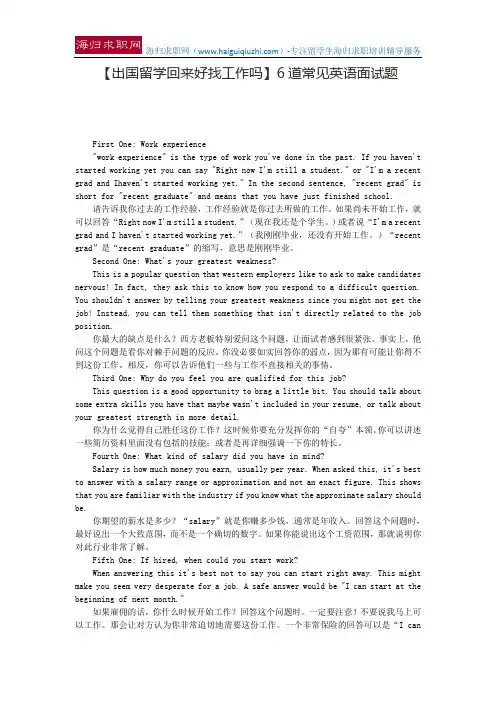
First One: Work experience"work experience" is the type of work you've done in the past. If you haven't started working yet you can say "Right now I'm still a student." or "I'm a recent grad and Ihaven't started working yet." In the second sentence, "recent grad" is short for "recent graduate" and means that you have just finished school.请告诉我你过去的工作经验,工作经验就是你过去所做的工作。
如果尚未开始工作,就可以回答“Right now I'm still a student.”(现在我还是个学生。
)或者说“I'm a recent grad and I haven't started working yet.”(我刚刚毕业,还没有开始工作。
)“recent grad”是“recent graduate”的缩写,意思是刚刚毕业。
Second One: What's your greatest weakness?This is a popular question that western employers like to ask to make candidates nervous! In fact, they ask this to know how you respond to a difficult question. You shouldn't answer by telling your greatest weakness since you might not get the job! Instead, you can tell them something that isn't directly related to the job position.你最大的缺点是什么?西方老板特别爱问这个问题,让面试者感到很紧张。
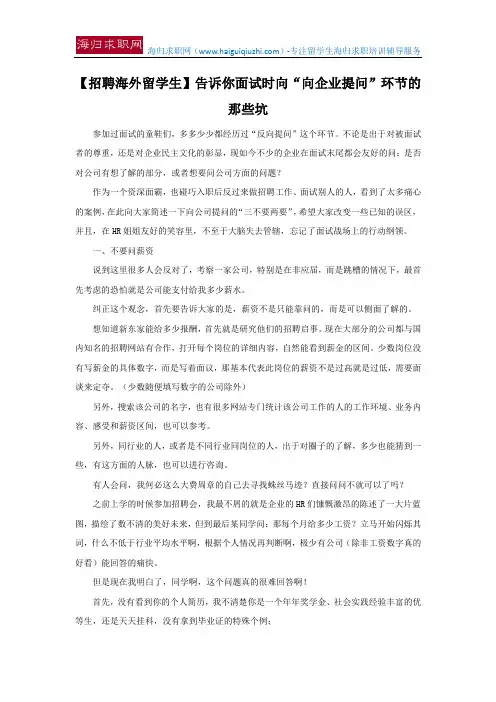
【招聘海外留学生】告诉你面试时向“向企业提问”环节的那些坑参加过面试的童鞋们,多多少少都经历过“反向提问”这个环节。
不论是出于对被面试者的尊重,还是对企业民主文化的彰显,现如今不少的企业在面试末尾都会友好的问:是否对公司有想了解的部分,或者想要问公司方面的问题?作为一个资深面霸,也碰巧入职后反过来做招聘工作、面试别人的人,看到了太多痛心的案例,在此向大家简述一下向公司提问的“三不要两要”,希望大家改变一些已知的误区,并且,在HR姐姐友好的笑容里,不至于大脑失去管辖,忘记了面试战场上的行动纲领。
一、不要问薪资说到这里很多人会反对了,考察一家公司,特别是在非应届,而是跳槽的情况下,最首先考虑的恐怕就是公司能支付给我多少薪水。
纠正这个观念,首先要告诉大家的是,薪资不是只能靠问的,而是可以侧面了解的。
想知道新东家能给多少报酬,首先就是研究他们的招聘启事。
现在大部分的公司都与国内知名的招聘网站有合作,打开每个岗位的详细内容,自然能看到薪金的区间。
少数岗位没有写薪金的具体数字,而是写着面议,那基本代表此岗位的薪资不是过高就是过低,需要面谈来定夺。
(少数随便填写数字的公司除外)另外,搜索该公司的名字,也有很多网站专门统计该公司工作的人的工作环境、业务内容、感受和薪资区间,也可以参考。
另外,同行业的人,或者是不同行业同岗位的人,出于对圈子的了解,多少也能猜到一些,有这方面的人脉,也可以进行咨询。
有人会问,我何必这么大费周章的自己去寻找蛛丝马迹?直接问问不就可以了吗?之前上学的时候参加招聘会,我最不屑的就是企业的HR们慷慨激昂的陈述了一大片蓝图,描绘了数不清的美好未来,但到最后某同学问:那每个月给多少工资?立马开始闪烁其词,什么不低于行业平均水平啊,根据个人情况再判断啊,极少有公司(除非工资数字真的好看)能回答的痛快。
但是现在我明白了,同学啊,这个问题真的很难回答啊!首先,没有看到你的个人简历,我不清楚你是一个年年奖学金、社会实践经验丰富的优等生,还是天天挂科,没有拿到毕业证的特殊个例;再一个,如果涉及到技术部分,我们可能需要部门领导面试加上技术考核,需要外语的部分也有外语考核来测试你是否符合岗位要求,只要不是最后一个给你面试的人,恐怕都拿不出一个具体的数字;第三,公司针对各类不同人群(例如博士/研究生学历或者外语大拿)可能有不同的奖金,这些也构成了工资的差异……如果不是应届生,需要考虑的因素会更多,这也是许多企业工资保密的原因——每个人考察的方面不同,被“利用”的技能不同,造成了薪资的差异。
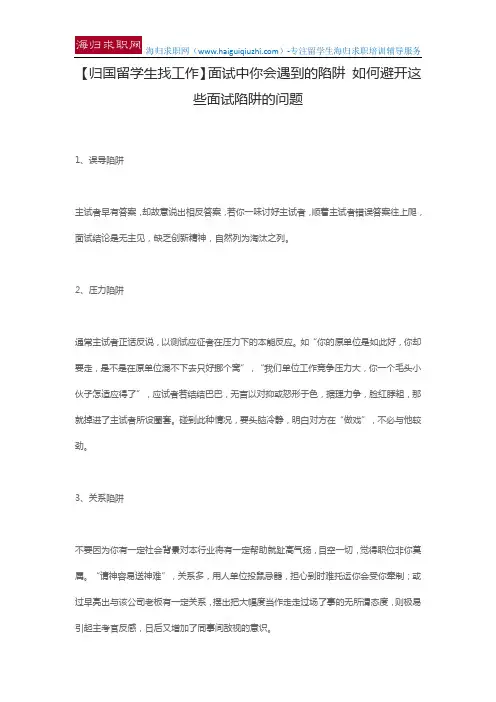
【归国留学生找工作】面试中你会遇到的陷阱如何避开这些面试陷阱的问题1、误导陷阱主试者早有答案,却故意说出相反答案,若你一味讨好主试者,顺着主试者错误答案往上爬,面试结论是无主见,缺乏创新精神,自然列为淘汰之列。
2、压力陷阱通常主试者正话反说,以测试应征者在压力下的本能反应。
如“你的原单位是如此好,你却要走,是不是在原单位混不下去只好挪个窝”,“我们单位工作竞争压力大,你一个毛头小伙子怎适应得了”,应试者若结结巴巴,无言以对抑或怒形于色,据理力争,脸红脖粗,那就掉进了主试者所设圈套。
碰到此种情况,要头脑冷静,明白对方在“做戏”,不必与他较劲。
3、关系陷阱不要因为你有一定社会背景对本行业将有一定帮助就趾高气扬,目空一切,觉得职位非你莫属。
“请神容易送神难”,关系多,用人单位投鼠忌器,担心到时难托运你会受你牵制;或过早亮出与该公司老板有一定关系,摆出把大幅度当作走走过场了事的无所谓态度,则极易引起主考官反感,日后又增加了同事间敌视的意识。
4、薪酬陷阱面对用人单位提出的薪酬期望值问题,求职者常不敢贸然回答。
回答低了,用人单位觉得你自信心不足,难成大器;回答高了,又觉得养不起你这条“大鱼”。
正确的回答是玩顾左右而言他,“打太极拳”,如巧妙回答“我想念公司会根据我的业绩给予合理报酬,以体现多劳多得原则”等,将球又踢了回来。
5、保密陷阱不要在大幅度中泄露你的创意和设计,或滔滔不绝地将原单位原本该保密的东西一股脑儿端出来,关键时刻应注意留一手。
轻易泄露公司机密,用人单位会联想此人今后会不会泄露我公司机密;右将你肚里的“货”全吐出来,那你岂不成为公司无用之人,我要你何干?6、经历陷阱不要因你富有工作经历而得意忘形,转职过多用人单位会觉得你好高骛远靠不住,若窝在一个工作岗位“奋斗”上十年,用人单位又说你无创造性。
经历不在多而在于是否有效,摆出有益于公司的硬东西来,自会受公司器重。
看过以上内容后,大家都应该学会了如何避开面试中你会遇到的陷阱,面试陷阱问题了。
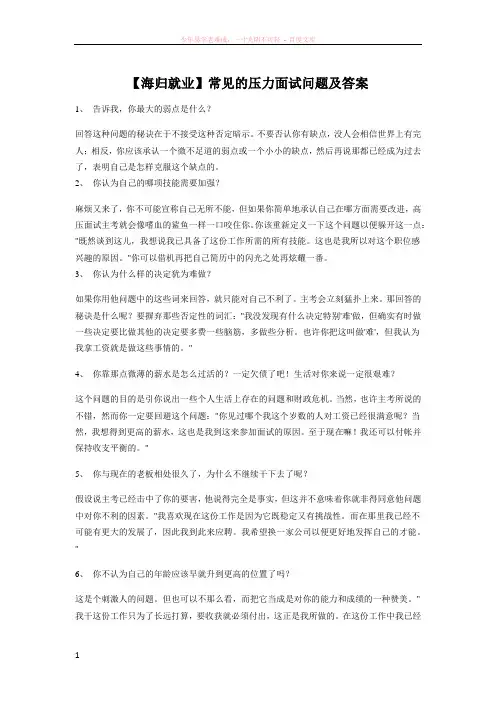
【海归就业】常见的压力面试问题及答案1、告诉我,你最大的弱点是什么?回答这种问题的秘诀在于不接受这种否定暗示。
不要否认你有缺点,没人会相信世界上有完人;相反,你应该承认一个微不足道的弱点或一个小小的缺点,然后再说那都已经成为过去了,表明自己是怎样克服这个缺点的。
2、你认为自己的哪项技能需要加强?麻烦又来了,你不可能宣称自己无所不能,但如果你简单地承认自己在哪方面需要改进,高压面试主考就会像嗜血的鲨鱼一样一口咬住你。
你该重新定义一下这个问题以便躲开这一点:"既然谈到这儿,我想说我已具备了这份工作所需的所有技能。
这也是我所以对这个职位感兴趣的原因。
"你可以借机再把自己简历中的闪光之处再炫耀一番。
3、你认为什么样的决定犹为难做?如果你用他问题中的这些词来回答,就只能对自己不利了。
主考会立刻猛扑上来。
那回答的秘诀是什么呢?要摒弃那些否定性的词汇:"我没发现有什么决定特别'难'做,但确实有时做一些决定要比做其他的决定要多费一些脑筋,多做些分析。
也许你把这叫做'难',但我认为我拿工资就是做这些事情的。
"4、你靠那点微薄的薪水是怎么过活的?一定欠债了吧!生活对你来说一定很艰难?这个问题的目的是引你说出一些个人生活上存在的问题和财政危机。
当然,也许主考所说的不错,然而你一定要回避这个问题:"你见过哪个我这个岁数的人对工资已经很满意呢?当然,我想得到更高的薪水,这也是我到这来参加面试的原因。
至于现在嘛!我还可以付帐并保持收支平衡的。
"5、你与现在的老板相处很久了,为什么不继续干下去了呢?假设说主考已经击中了你的要害,他说得完全是事实,但这并不意味着你就非得同意他问题中对你不利的因素。
"我喜欢现在这份工作是因为它既稳定又有挑战性。
而在那里我已经不可能有更大的发展了,因此我到此来应聘。
我希望换一家公司以便更好地发挥自己的才能。
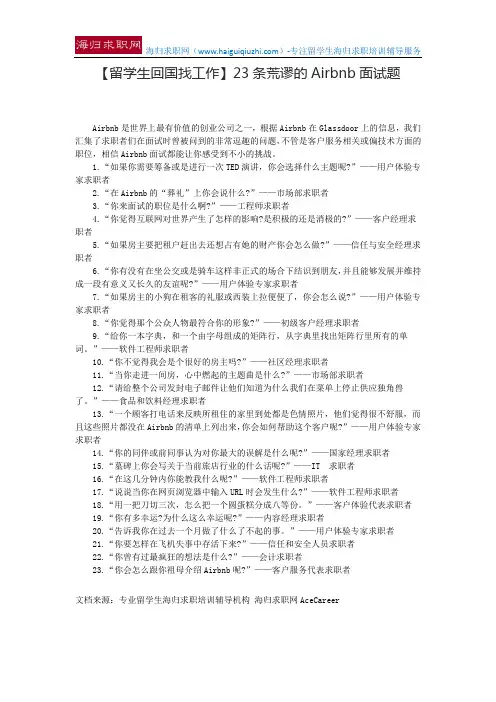
Airbnb是世界上最有价值的创业公司之一,根据Airbnb在Glassdoor上的信息,我们汇集了求职者们在面试时曾被问到的非常逗趣的问题,不管是客户服务相关或偏技术方面的职位,相信Airbnb面试都能让你感受到不小的挑战。
1.“如果你需要筹备或是进行一次TED演讲,你会选择什么主题呢?”——用户体验专家求职者2.“在Airbnb的“葬礼”上你会说什么?”——市场部求职者3.“你来面试的职位是什么啊?”——工程师求职者4.“你觉得互联网对世界产生了怎样的影响?是积极的还是消极的?”——客户经理求职者5.“如果房主要把租户赶出去还想占有她的财产你会怎么做?”——信任与安全经理求职者6.“你有没有在坐公交或是骑车这样非正式的场合下结识到朋友,并且能够发展并维持成一段有意义又长久的友谊呢?”——用户体验专家求职者7.“如果房主的小狗在租客的礼服或西装上拉便便了,你会怎么说?”——用户体验专家求职者8.“你觉得那个公众人物最符合你的形象?”——初级客户经理求职者9.“给你一本字典,和一个由字母组成的矩阵行,从字典里找出矩阵行里所有的单词。
”——软件工程师求职者10.“你不觉得我会是个很好的房主吗?”——社区经理求职者11.“当你走进一间房,心中燃起的主题曲是什么?”——市场部求职者12.“请给整个公司发封电子邮件让他们知道为什么我们在菜单上停止供应独角兽了。
”——食品和饮料经理求职者13.“一个顾客打电话来反映所租住的家里到处都是色情照片,他们觉得很不舒服,而且这些照片都没在Airbnb的清单上列出来,你会如何帮助这个客户呢?”——用户体验专家求职者14.“你的同伴或前同事认为对你最大的误解是什么呢?”——国家经理求职者15.“墓碑上你会写关于当前旅店行业的什么话呢?”——IT 求职者16.“在这几分钟内你能教我什么呢?”——软件工程师求职者17.“说说当你在网页浏览器中输入URL时会发生什么?”——软件工程师求职者18.“用一把刀切三次,怎么把一个圆蛋糕分成八等份。
【出国留学回来好找工作吗】史上最奇葩的职场面试题你能搞定吗?如果让你去擦西雅图市的所有窗户,你会收多少钱?拆解:这类难题旨在衡量面试者破解难题的能力。
在面对这样的问题时,多数人过于纠结于字面意思,例如,试图估算出西雅图市有多少扇窗户,结果让自己陷入困境。
其实,建议面试者考虑你对这项工作本身收多少钱,“例如每扇窗户的固定金额,或者每小时的收费。
”不论你给出怎样的答案,“一定要解释思考过程”,以及得出答案的步骤。
用一两句话,向你8岁大的侄子解释一个数据库。
拆解:谷歌的面试官经常会用这个问题,来判断面试者能否将一个复杂的问题简单化,把行话变成白话。
这种能力“在那些与客户直接接触的职位中尤其重要,因为客户往往不能掌握最新的科技术语。
”报告补充说,最好的答案应该是“简短而又令人感觉新鲜”——例如“一个数据库就像是一台机器,可以记住关于各种不同事物的大量信息。
”你早餐吃的什么?拆解:除了观察你应对突发问题的反应能力,面试官还希望通过这个问题确定你与公司文化的契合度。
一顿早餐是否能体现一个人的个性(或是有何不同),这一点仍值得商榷,但面对这个问题,求职者的答案应该与“公司释放的信号”相匹配——比如酥脆的格拉诺拉麦片、烟肉和鸡蛋,一杯黑咖啡或者一块馅饼。
向一位盲人形容黄色。
拆解:这个问题是要测试你的沟通能力,以及“敏感性、自发性和表达抽象概念的能力”,它“要求你思考黄色的特点,并用积极的方式进行解释(不要提及黄色的物品,例如香蕉。
)”如果你坐在工位上,发现收件箱里有1000封电子邮件,但你只能回复其中的300封,你会如何选择?拆解:这是在考察你的工作是否有条理,你如何安排工作的优先顺序。
建议这样回答:首先查看来自上司、最大客户的电子邮件或其他人发来的可能非常重要的信息,然后搜索主题栏中的关键字,确定紧急程度。
至于那些表示紧急的红色小感叹号,除非他们属于上述两类邮件,否则就不要理会。
现在真正需要你的人会给你打电话。
【国外留学回来找工作】经典面试问题及答案hr问你对加班有什么看法怎么答一:缺乏经验,你怎么胜任这份工作?首先要承认这是你目前的一个局限,但这是一个客观因素。
大学毕业生没有正式走进社会,无法积累丰富的工作经验。
你可以列举自己做这份工作的优势。
一个是你本身具有与之匹配的气质类型。
比如你应聘销售,那么你要展示自己开朗外向、善于沟通、说服力强的个性;如果你应聘人力资源管理,你可以说明自己很有亲和力。
另一个,是表明自己有过相关的实习经验或学生工作经验。
比如应聘经理助理,你可以说明自己曾经担任学生会主席,有相当的组织能力和号召力。
参考答案:1、“虽然我从来没有做过人力资源助理,但是,我在学校当班长的时候,班上对内对外的很多事情,都是由我来出面处理的,老师很欣赏我处理事情的能力,同学们也都很信任我,有什么事情都愿意向我诉说,寻求帮助。
”二:你对加班有什么看法?首先说明,高效工作是人才的一个必备素质,也是为企业提高效率的一个途径。
因此,能在工作时间内完成的就不要拖到休息时间。
但如果是工作需要,或者公司做了临时的安排,那加班完成工作当然是义不容辞。
另外,最好还能说明自己可以加班的条件,比如目前尚无家室,可以抽出较多的时间来工作。
参考答案:“我对自己的办事效率还是非常有自信的,但是如果因为工作需要而加班,那当然是义不容辞的———‘把事情做好’是我一贯的准则。
而且,我目前尚未成家,也可以抽出比较多的时间和精力。
”三:你希望从这个职位得到什么?首先应该表明你对这个职位的兴趣,然后思考一下这个职位需要什么样的能力和经验。
其次,你还可以有一个职业目标。
参考答案:“我对销售工作非常有兴趣,这个职位可以教给我快速沟通的能力、分析和判断能力,以及产品的专业知识水平。
我想,我会以最快的速度去掌握这些技能,并且把它们最好地运用到实际工作中来。
”四:这项工作有什么困难?面试官这么问,往往是想考察一下你对所要从事的工作的了解程度,以及你解决问题的实际能力。
【法国留学生回国就业】最难的面试题,面试最难的公司小编在这里就列出其中的Top 10还有一些大家比较熟悉的公司。
1、麦肯锡McKinsey & Company面试难度:3.9负面面试体验度:13%员工满意度:4.1面试问题:“有三种产品:西红柿,名车和T恤,每种产品的增值税应是多少?”——McKinsy & Company初级咨询师面试题2、波士顿咨询公司Boston Consulting Group面试难度:3.8负面面试体验度:10%员工满意度:4.1面试问题:“会有多少人用药物防秃顶?”——波士顿咨询公司合伙人面试题3、奥维咨询Oliver Wyman面试难度:3.7负面面试体验度:9%员工满意度:3.6面试问题:“飞机上无线网服务的潜在利润是多少?”——奥威咨询师面试题4、科尔尼管理咨询公司A.T. Kearney面试难度:3.7负面面试体验度:12%员工满意度:3.4面试问题:“除了生产线流水化和减少购买原材料的开支之外,你有哪些方法可以减少巧克力的制作成本?”——科尔尼管理咨询公司商业分析师面试题5、ZS管理咨询公司ZS Associates面试难度:3.7负面面试体验度:6%员工满意度:3.4面试问题:你正在提供顾问服务的一家制药公司会推出两种新产品。
哪些因素将有助于这家公司决定如何分配销售力量?”——ZS Associates合伙人面试题(地点:加利福尼亚州的圣马特奥市)6、全球IT咨询公司ThoughtWorks面试难度:3.6负面面试体验度:16%员工满意度:3.8面试问题:“面试我,然后告诉我你会不会聘用我。
”——ThoughtWorks人才发掘者的面试问题7、贝恩咨询公司Bain & Company面试难度:3.6负面面试体验度:2%员工满意度:4.2面试问题:“估测一下纽约有多少窗户。
”——贝恩咨询公司助理顾问的面试问题。
8、壳牌Shell面试难度:3.6负面面试体验度:4%员工满意度:3.8面试问题:“请说出两三点公司多样化的弊端。
【海归就业力调查报告】那些个呛人的面试问题你会回答吗?如果你想成为奈飞的一员,可能得先回答一些面试中的难题。
从美国招聘网站Glassdoor提供的有关奈飞公司的信息,我们整理汇编了应聘者口中这家广播视频公司招聘面试中的一些最难的问题。
Ifyou want to work at Netflix, you might have to answer some hard interview questions first.如果你想成为奈飞的一员,可能得先回答一些面试中的难题。
UsingGlassdoor's information about Netflix, we've compiled some of the most difficult questions that people say they've been asked while interviewing for the streaming-broadcast company.从美国招聘网站Glassdoor提供的有关奈飞公司的信息,我们整理汇编了应聘者口中这家广播视频公司招聘面试中的一些最难的问题。
Thequestions say a lot about Netflix and its company culture.这些问题都在很大程度上与奈飞的公司文化有关。
Nomatter if you're looking for a customer-service job or a more technical position, Netflix's interview questions will give you a run for your money.不管你是想竞聘客服的工作还是更加偏向专业技术方面的工作,看看奈飞的面试问题,你会对自己的面试有些把握,一定是提神醒脑的。
1“Howmany cans of paint would you need to paint one wing of a 747?”—Marketing manager candidate想喷涂波音747的一支机翼,你需要多少罐涂料?——营销经理候选人2“Wh atdoes the word empathy mean?”—Customer service representative candidate“移情”这个词,你怎么看?——客服代表候选人3“Howwould you test the latest iPhone's new antenna system?”—Senior QA engineer candidate你打算怎样检测苹果手机最新的天线系统?——高级质检经理候选人4"Acustomer calls and angrily tells you that they ordered Barney (or similar toddler show) for their kid. The kid can work the DVD player, and knows the Netflix envelope. When the movie arrived the kid grabs it and pops it in. Turns out it's a slasher movie. What do you do?" —Customer service representative candidate顾客打来电话,生气地说他为孩子订购了Barney节目(或者是类似的儿童节目)。
【留学生回国就业】20个面试问题以及答案,统统打包送给你好东西来了!interview questions和answers一起打包送给你!以前收集了一堆interview questions却还没有时间准备回答?现在我们就把答案发给你,好好练习!"What are your goals for the future?" or "Where do you see yourself in five years?"Don't discuss your goals for returning to school or having a family, they are not relevant and could knock you out of contention for the job. Rather, you want to connect your answer to the job you are applying for.最佳答案* My long-term goals involve growing with a company where I can continue to learn, take on additional responsibilities, and contribute as much of value as I can.* I see myself as a top performing employee in a well-established organization, like this one. I plan on enhancing my skills and continuing my involvement in (related) professional associations.* Once I gain additional experience, I would like to move on from a technical position to management.* In the XYZ Corporation, what is a typical career path for someone with my skills and experiences?Tell me about yourself/ How would you describe yourself?You walk into the interview room, shake hands with your interviewer and sit down with your best interviewing smile on. Guess what their first question is? "Tell me about yourself." Your interviewer is not looking for a 10-minute dissertation here. Instead, offer a razor sharp sentence or two that sets the stage for further discussion and sets you apart from your competitors.Your Unique Selling Proposition (USP)说出你的卖点Give them "your synopsis about you" answer, specifically your Unique Selling Proposition. Known as a personal branding or a value-added statement, the USP is a succinct, one-sentence description of who you are, your biggest strength and the majorbenefit that a company will derive from this strength. Here is an example of a Unique Selling Proposition: "I'm a seasoned Retail Manager strong in developing training programs and loss prevention techniques that have resulted in revenue savings of over $2.3Million for (employer's name) during the past 11 years."What a difference you've made with this statement. Your interviewer is now sitting forward in her chair giving you her full attention. At this point, you might add the following sentence: "I'd like to discuss how I might be able to do something like that for you." The ball is now back in her court and you have the beginnings of a real discussion and not an interrogation process.“My background to date has been centered around preparing myself to become th e very best financial consultant I can become. Let me tell you specifically how I've prepared myself. I am an undergraduate student in finance and accounting at _________ University. My past experiences has been in retail and higher education. Both aspects have prepared me well for this career.”首先要明确他们想了解的是哪方面的内容Do they want to know about your career so far, about your hobbies or family life? If in doubt, ASK them to clarify what they wish you to talk about. Then give a short factual answer, ending with "is there anything else you'd like to know about me?"* How would you describe yourself?这个问题的答案应该是和他们的招聘广告上对于雇员的要求的基本一致,所以,看看你有哪些特质满足了他们的要求吧Try to think about what the interviewers are looking for and keep this in mind as you answer interview questions. Remember the job advert? Were they looking for initiative, a good communicator, someone with good attention to detail? Describe yourself in these terms. Start with "I am.." and not with "I think..." or "I believe.." so that you sound self aware and confident.-----------------------------------------------------------When you're interviewing for an internal position within your company, you may be asked what you will do if you don't get the job. The interviewer wants to know whether you are concerned about just the advancement opportunity or the company.内部职位竞聘常会被问到如果你没有得到这份工作的话你将会怎么办的问题。
【留学生找工作】留学生回国找工作见过最不走心的面试题了...HowtoAnswer“WhatIsYourGreatestWeakness?”基本90%面对“WhatIsYourGreatestWeakness?”这个的问题的应聘者,都会在心里对面试官翻个白眼。
因为,大家都感觉这是一个很没有意义的问题。
毕竟,没有那个应聘者会把自己的缺陷像讲故事一样,一五一十地说给面试官听。
但是,这个问题已经成为在每家公司都是一个陈词滥调的问题。
即使面试官知道他们不太可能得到应聘者100%诚实的答案。
然而,他们仍然会问这个问题。
比如:上至manager/VP,下至intern;纵贯咨询、投行、精算、四大...试问有谁躲得过这一问?一为什么每家公司面试官必问weakness?为什么面试官明知道得不到100%诚恳的答案,却还是坚持会问这个问题呢?因为他们试图通过你在参加面试时所呈现出的良好的状态,并了解你真正喜欢的工作是什么。
是积极的?坏的?或者其他。
即使你的回答不够诚实,如果你躲避这个问题,或者试图伪造你的回答,面试官就会继续给你挖坑,而且这个坑一挖就停不下来:1)You’vegotscarysecretweaknessesthatyouwon’tdiscuss.2)Youthinkyou’reperfectbecauseyouhavenoself-awareness.3)Youthinkyou’reperfectbecauseyourstand ardsareverylow.4)You’reaconartist.(thismaybeokayifyou’reinpoliticsorpublicrelations)面试官问你的greatestweakness,除了想知道你的弱项会否影响你在这个岗位上的表现,也有两个很重要的目的:1)想知道你有多了解自己2)你有否有主动为自己的弱项/劣势做出改变而你回答好一个关于你的weakness问题,是非常有说服力的。
二关于weakness的一些常见&延伸问题1,关于weaknesses面试题的6种套路虽说这已经是一个老生常谈的面试题。
但是面试官还是会变着花样来问。
比如:1)Whatisyourgreatestweakness?(最常见也是最常规的)2)Whataresomeofyourweaknesses?(注意:面试官已经开始挖坑)3)Whatareyourstrengthsandweaknesses?(优缺点一起来。
)4)Tellmeaboutadevelopmentgoalthatyouhaveset.(拐着弯问你的缺点,以及设达成目标的能力)5)Ifyoucouldchangeonethingaboutyourself,whatwoulditbe?(面试官的措辞可能远不止此)6)Whatdoyoumostwanttoimproveinthenextyear?(这个措辞采取更积极的态度,但仍然是一个weaknesses问题。
)2,关于weaknesses的3类后续问题除了准备weakness面试的回答之外,能够成功突破面试大关的同学还准备了,面试官在你回答完之后紧接着可能会提出的问题,特别是当你第一个问题回答的说服力不足时。
继续举例:1)Buthowhasthatweaknessnegativelyaffectedyou?(如果你weakness问题回答得不够好,紧接着就是这个问题)2)OK,howaboutarealweakness?(面试官对你的答案持怀疑态度时,请准备好迎接这个更加尖锐的问题)3)Canyoushareanotherweaknessorareafordevelopment?(同上:))三留学生常犯错误集锦1,试图设定一个从负面逆袭到正面的形象你会发现许多书籍和文章,建议求职的同学通过分享一个工作/学习方面的弱点,并将“负面转化为积极”的故事。
举几个例子:1)Iamtoomuchofaperfectionist.2)Iworktoohardsometimes.3)Icaretoomuchaboutmywork.对于面试官来说,是同样的道理。
第一个用这种方法的人是天才,第二个是什么不用多说。
2,拒绝/婉拒回答这个问题有些同学会断言他们不能想到一个weakness。
这表明在面试前完全没有准备好,并且可能导致面试陷入一种尴尬的氛围。
相信咱们的粉丝都不会用这个本方法。
就不赘述了。
3,面对自己的weakness,过于坦诚另一个错误是太过于坦白,承认自己的缺陷所在。
如果你天真的一位面试官会夸你诚实,那你就踏错特错了。
这反而会令你一直以来展现的良好形象土崩瓦解。
举个例子:“Ihavetroublegettingupinthemorningandgettingtoworkontime.”主页君只想说:Hisrealweaknesswasthathewaswaytoohonest.4如何回答“What’sYourGreatestWeakness?”一个好的weakness问题答案有两个重要部分:1)Yourweakness(简要描述一个真正的弱点)2)Howyouarealreadyworkingonit(这是最关键部分)1,如何选择一个“好得”缺陷/弱点?一定要真实不要因为这个弱点听起来不错而选择它。
更明智的应聘者知道用诚意打动面试官,将会留下更深刻的印象。
这并不意味着你必须分享一个,使你看起来不好的弱点。
如果你像我们大多数人一样,有几个弱点,其中至少有一个是适合你自己在面试时使用的。
选择一个面试官可以接受的弱点一切以这份工作的JD为出发点。
不要引用与岗位所需技能或期望质量相关的任何缺陷。
如果你是会计师,不要谈论讨厌数学或缺乏对细节的关注。
如果你在销售,不要承认太保留或缺乏耐心。
选择一个相对较小并“可修复”的弱点比如通过后天的努力,通过工作和动机可以改善的缺点。
举个例子:1)可修复型:“Igetnervouswhenspeakinginfrontoflargegroups.”(您可以通过实践和学习新技能改善这一缺点。
)2)难以修复型:“Iamveryshyandoftenhavetroublespeakingupinmeetings.”(虽然害羞没有任何问题,但面试官可以假设你在团队环境中无法协调,这是一种偏好或个性素质,更难改变。
)用简明,中立的方式描述你的弱点并非回答所有问题,都必须深入细节。
用简短,概括性的话语回答这个问题,有利于你避免展现过多消极的信息,以及防止给面试官提供更多挖坑的机会。
2,如何证明你正在努力改善自己的弱点?在你的答案的第二部分,你需要描述自己已经采取措施,如何改善你的弱点。
这就是为什么:1)Agreatcandidateisalwayslookingforwaystolearnandgrow2)Afabulouscandidatethentakestheinitiativetoimprove通过你在做什么的回答,来证明你的动机是最好的。
当你和面试官谈到你的弱点时,这也是能够给对方刘留下积极印象的关键是。
几个推荐的答案模板Example1:TooDirect “SometimesIcanbeabittoohonestwhenIprovidefeedbacktocoworkers.Mypersonalityisnaturallyverystraightforwardandtothepoint,andmostofmycolleaguesreallyvaluethat,bu tIhavelearnedthattherearetimesonthejobwhenmorediplomacyisrequired.Itookatrainingclassonconflictmanagementanditreallyopenedmyeyestotheneedtoco mmunicatedifferentlywithdifferentpeople.SonowIammuchbetteratprovidingconstructi vefeedback,evenifitdoesn’talwayscomenaturally.”Example2:PublicSpeaking“Honestly,IwouldsaythatpublicspeakingisanareathatIcouldworkon.Itendtogetnervou swhenaskedtopresenttoalargegroupofpeople.Insmallteammeetings,I’mthefirstonetos tandupandpresent.ButputmeinfrontofabiggroupandIcangetflustered.Iactuallyspoketomymanageraboutthisandwesetitasoneofmydevelopmentgoalsforthi syear.ItookaninternalpresentationskillsclassandattendedsomemeetingsofToastmaste rs,anetworkinggroupforpeoplewhowanttopracticepublicspeaking.Withsomepractice,Is stmonth,Ievenvolunteeredtorepresentourteamatadivi sion-widetownhall.Ionlyhadtopresentfor10minutes,butIdiditandgotgreatfeedback!It wasactuallykindoffun,soIplanoncontinuingtoseekoutopportunitiestoimproveinthisar ea.”文档来源:专业留学生海归求职培训辅导机构海归求职网AceCareer。